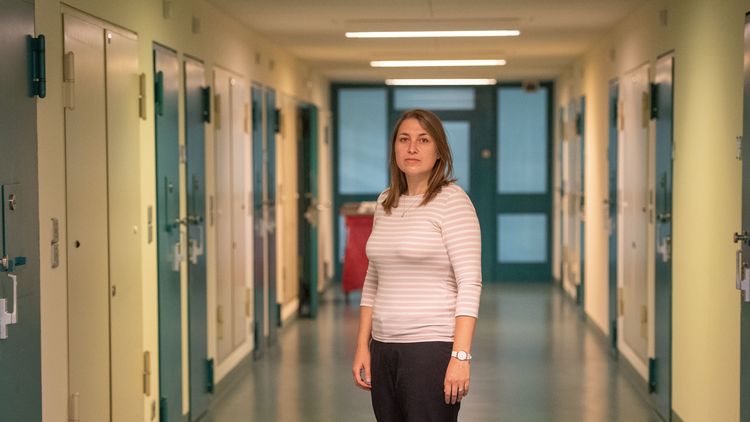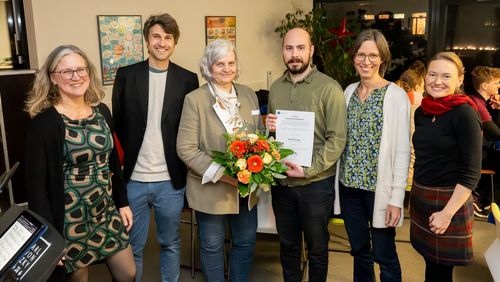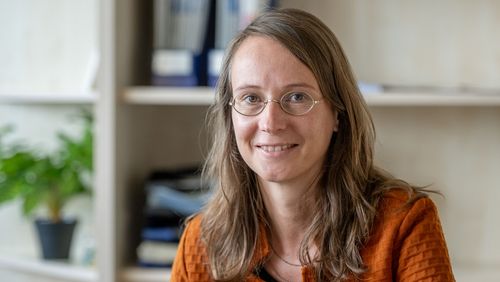Understanding Prisons
According to human geographer Jennifer Turner, the military past of prison facilities and prison staff shapes the entire penal system. At the university’s Institute for Social Sciences she explores the connections between prisons and the military.
The date is May 8, 2020. In West Yorkshire, England, a group of young men are taking part in celebrations marking the 75th anniversary of the end of the Second World War. These adolescents are offenders incarcerated in a former naval facility which is now a prison, supervised by prison staff who are ex-military personnel. "There are deep-rooted connections between prisons and the military, and not just in Britain but in many countries of the Global North – including Germany," Dr Jennifer Turner explains. This complex web of connections takes many forms: prisons are often located in former military buildings, a growing number of prison staff are former military personnel, and the proportion of military veterans among the inmates is relatively high – at least in the UK and the US. The British-born researcher refers to these connections, which have been little studied to date, as the “prison-military complex”.
Turner took up her position at the Institute for Social Sciences in 2020 and has built up the Crime and Carcerality research group there. Her field of research belongs to a new and diverse subdiscipline of geography known as carceral geography. This field, in which Turner plays a prominent role, adds a spatial perspective to prison research, which has so far focused mainly on sociological aspects. The goal of carceral geography is to gain a better understanding of the functioning of prisons and other closed spaces such as refugee camps, psychiatric hospitals, retirement- and children’s homes. With her research group, Turner aims to establish this relatively new field of prison research in Germany, where it has very little academic footing to date. She focuses primarily on prison staff and the role played by ex-military personnel as prison officers. "For our study in the UK, we asked former and current staff about their military experience, duties, and how long they had served in the military," Turner explains. She has also collected data in Canada, and now plans to conduct similar studies in Germany and Norway with the goal of comparing countries with different military histories and different approaches to the prison service.
“We hope this comparison will offer us insights into how the prison system can be improved," says Turner, who recently completed her habilitation in Oldenburg. The data could shed light on whether it makes sense for prisons, like those in the UK, to specifically recruit former military personnel. Turner suspects that due to their military experiences, former soldiers are better equipped than other prison staff to find common ground with incarcerated veterans.
In three studies published in 2021 and 2022, Turner showed that about 25 percent of prison staff in the UK have a military background – a figure that even she found surprisingly high. "Our research has demonstrated that this group already enjoys the training for the job more than others," says Turner. From these findings, the team concludes that individuals with a military background generally find it easier to adapt to structures which for them are more familiar, such as wearing uniforms and using formal language.
But how does a military background affect their professional skills? "We often hear the prejudiced view that prison staff with a military background are particularly strict and aloof, that they sometimes bully prisoners and resort to violence when deemed necessary," says Turner. However, her research shows that the opposite is more likely to be the case: 73 percent of prison staff with a military background see their workplace less as a place of punishment and more as a place for rehabilitation.
It also became clear that although former armed forces personnel often display typical military traits such as discipline, punctuality and respectful behaviour, they also exhibit many unexpected traits. "We were able to show that empathy, communication skills and an understanding of diversity go hand in hand with military experience," explains Turner.
Ex-military personnel are also often very alert and well trained in dealing with crisis situations. "If I were
inprison, I would want the staff to have precisely these qualities," Turner notes. Whether prisoners take a similar view is a topic the geographer plans to investigate in the near future. As she says: "We will only be able to fully
understand the military nature of prisons and the role of prison staff if we know and include the prisoners' perspective."
This text was first published in the 2022/23 issue of the research magazine EINBLICKE.
Topics
- Astronomy
- Biology
- Botanical garden
- Chemistry
- Computing Science
- Cooperations
- Covid
- Culture
- Dutch Studies
- Early Career
- Economics
- Educational Sciences
- Energy
- Energy Research
- Environmental Sciences
- Equal opportunities
- German Studies
- Graduate academy
- Health Services Research
- Higher Education Policy
- History
- Human Medicine
- International affairs
- Marine Sciences
- Material Culture
- Medical ethics
- Medical Physics and Acoustics
- Music
- Neuroscience
- People
- Philosophy
- Physics
- Presidential Board
- Psychology
- Research
- Slavic Studies
- Social Sciences
- Special Needs Education
- Sport Science
- Study Affairs
- Sustainability
- Teacher Education
- Theology
- Transfer
- University Medicine
- Ukraine
- Wind Physics







